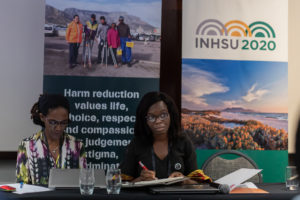29 March 2021
INHSU’s South African partners have released a new brief ‘Harm Reduction Responses in the Age of COVID-19’. The report features detailed learnings from South Africa’s four largest metros (Cape Town, Durban, Johannesburg and Pretoria) alongside recommended actions for national, local and provincial governments.
The report is aimed at people who use drugs and organisations that work with and for them, organisations working in harm reduction, government officials at national, provincial and local government and funders.
It builds on the partnerships developed at INHSU Africa in February 2020 and was funded by INHSU via a grant from the Open Society Foundations.
“Despite the limitations due to COVID-19, since INHSU Africa we have worked hard to continue to support the important relationships built at that event,” says INHSU executive director Emma Day. “In collaboration with local partners, we held three virtual roundtable events last year and have another two planned this year. This summary of harm reduction service delivery during COVID is an impressive, detailed brief that we hope will facilitate change across South Africa and provide people who use drugs with the support needed during COVID and beyond. We thank all stakeholders involved for their leadership.”
Key findings of the Harm Reduction Responses in the Age of COVID-19 brief

Before COVID-19, people who use drugs in South Africa had limited access to harm reduction services already. COVID-19 and the consequent lockdowns, created new challenges in providing treatment, care and support to people who use drugs.
At the same time, opportunities arose which allowed for innovation in the delivery of harm reduction services for people who use drugs in South Africa.
While each city responded differently according to their context, the innovations in each resulted in notable change.
These included shifting to a harm-reduction-centred approach to substance use in Cape Town; scaling up best practices to take-home Opioid Substitution Therapy (OST) in Pretoria; providing long-term withdrawal management in Durban, and safe-guarding human rights and advocacy for harm reduction in Johannesburg.
COVID-19 Harm Reduction Recommendations
This is just a small selection of the recommendations made in the brief for national, local and provincial governments, funders and organisations:
For national governments
- The networks of people who use drugs should form part of all consultations and planning of services that affect them
- Implement and invest in further scale-up of NSP and OST services
- The national government should expedite the listing of methadone on the Essential Medicines List for maintenance use at primary care service sites that have the staffing, infrastructure and networks to provide OST
For local governments
- Establish mobile harm reduction services for rural areas and consider using these to increase coverage in peri-urban areas of metros
Ensure budget allocated for viral hepatitis prevention, diagnostic and treatment services
include people who use drugs
For provincial governments
- City officials, together with partner organisations, should be playing a significant role
in crafting harm reduction implementation plans. It is at the level of the city/metropole that
innovation and model building around harm reduction should take place
For funders
- Consult with service users and their representative networks on what is needed and what
should be prioritised - Allow for flexibility in the provision of harm reduction services
- Allow for flexibility in terms of reporting
Harm Reduction Responses in the Age of COVID-19 brief – partners
Thank you to the 20 organisations who collaborated on the brief and continue to conduct and support harm reduction responses in South Africa including TB HIV Care, Step UP Project, South African Network of People who Use Drugs, STAND, Cape Town Drug Counselling Center, Groote Schuur Liver Clinic, City of Cape Town, Durban University of Technology Urban Futures Centre, Advance Access and Delivery, City of eThekwini, Anova Health Institute JAB Smart, City of Johannesburg, Community Oriented Substance Use Programme (COSUP), University of Pretoria, Tshwane Homelessness Forum, Doctors Without Borders (MSF), Sediba Hope Medical Centre, City of Tshwane.

